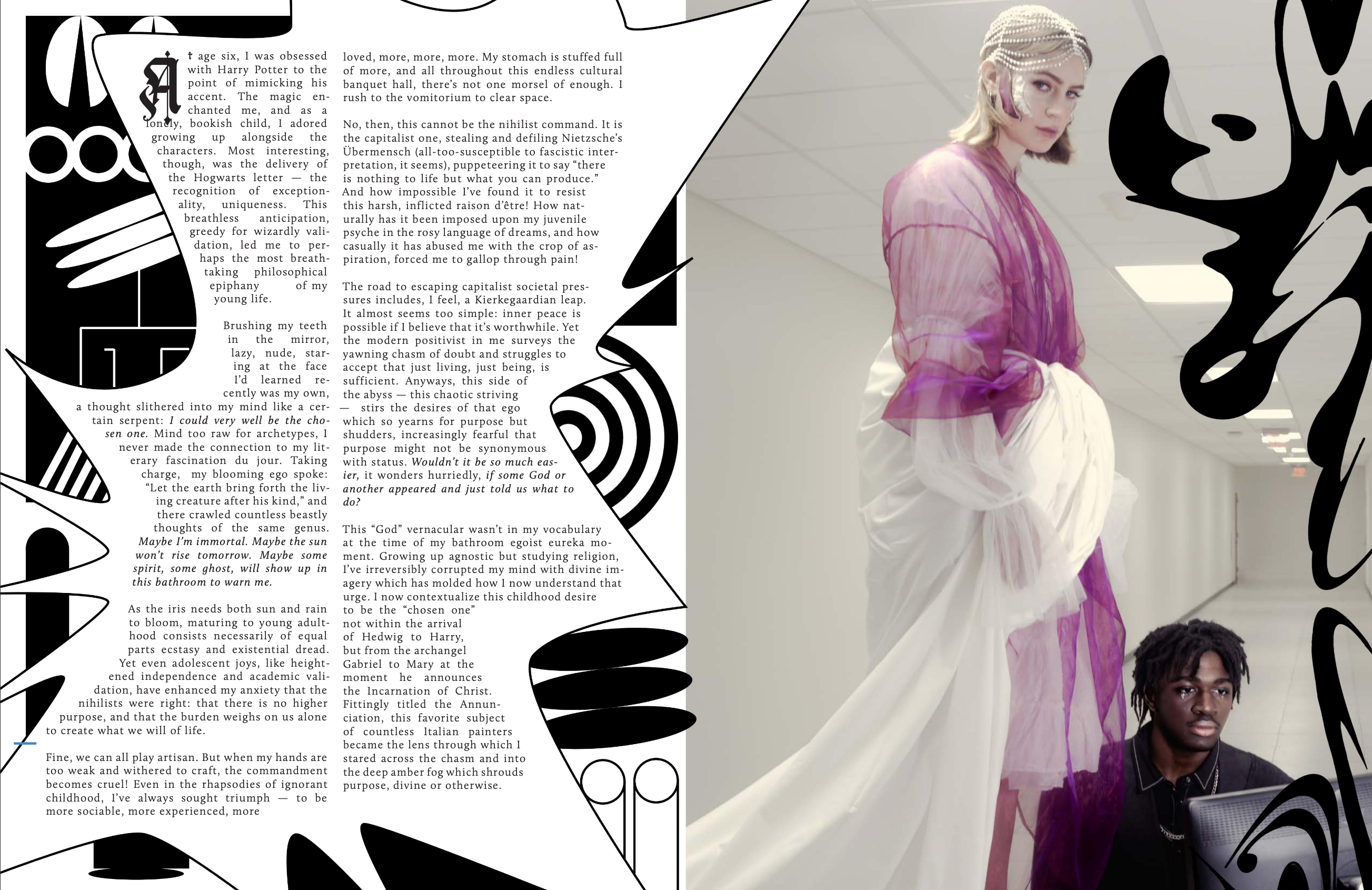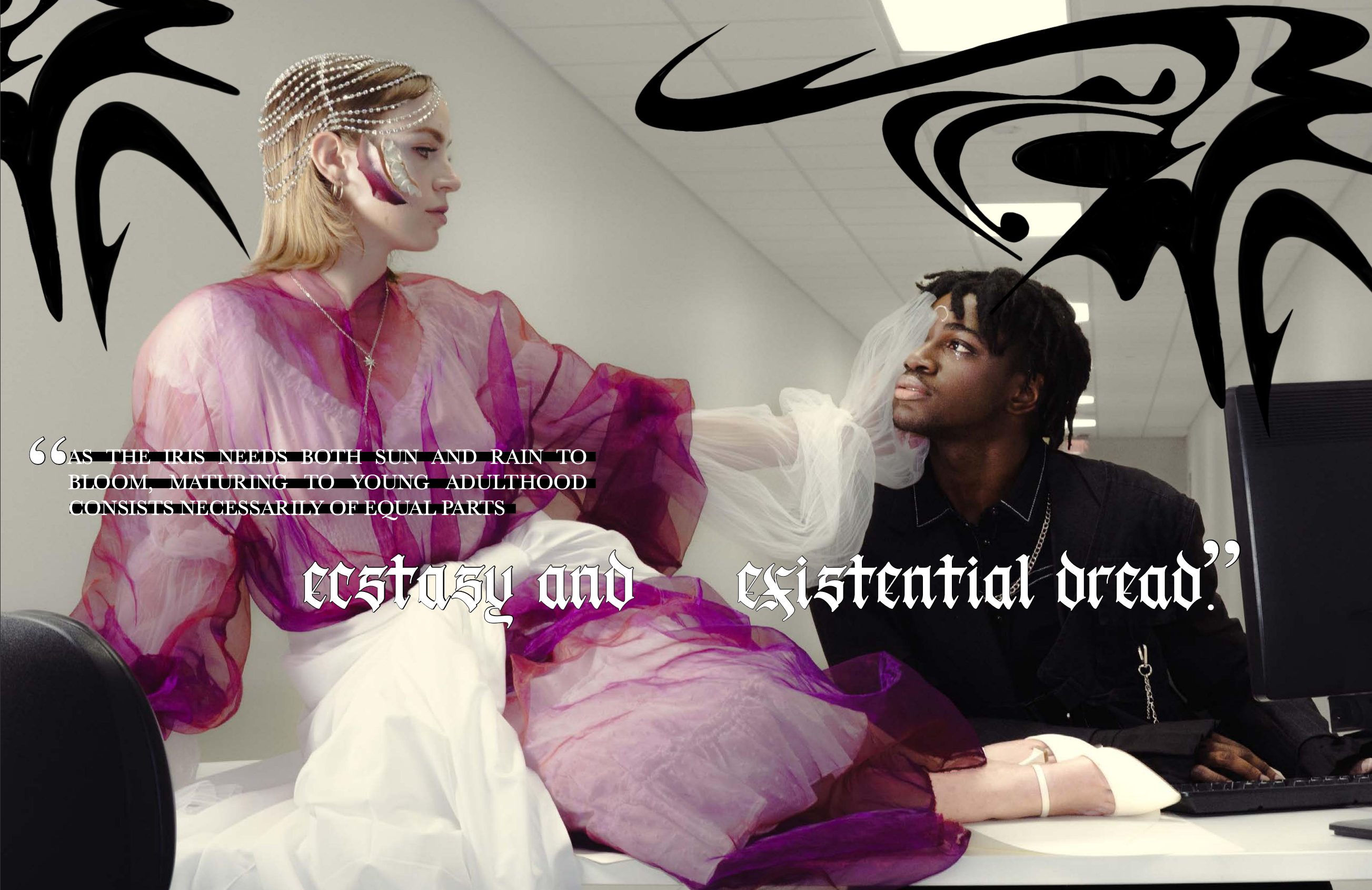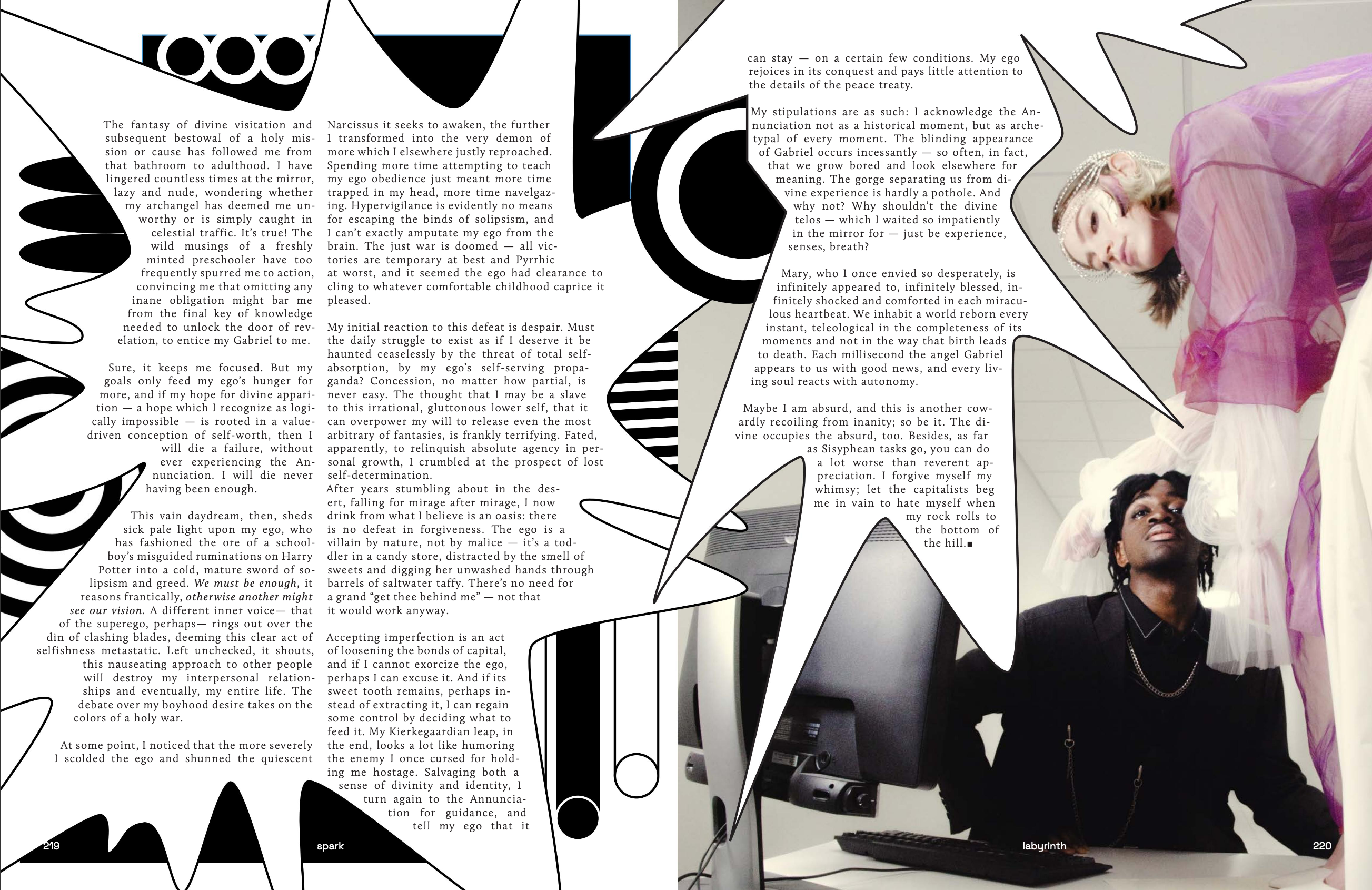Be Not Afraid

| When all moments are intimate connections with divinity, what use have we for fear? |
At age six, I was obsessed with Harry Potter to the point of mimicking his accent. The magic enchanted me, and as a lonely, bookish child, I adored growing up alongside the characters. Most interesting, though, was the delivery of the Hogwarts letter — the recognition of exceptionality, uniqueness. This breathless anticipation, greedy for wizardly validation, led me to perhaps the most breathtaking philosophical epiphany of my young life.

Brushing my teeth in the mirror, lazy, nude, staring at the face I’d learned recently was my own, a thought slithered into my mind like a certain serpent: I could very well be the chosen one. Mind too raw for archetypes, I never made the connection to my literary fascination du jour. Taking charge, my blooming ego spoke: “Let the earth bring forth the living creature after his kind,” and there crawled countless beastly thoughts of the same genus. Maybe I’m immortal. Maybe the sun won’t rise tomorrow. Maybe some spirit, some ghost, will show up in this bathroom to warn me.
As the iris needs both sun and rain to bloom, maturing to young adulthood consists necessarily of equal parts ecstasy and existential dread. Yet even adolescent joys, like heightened independence and academic validation, have enhanced my anxiety that the nihilists were right: that there is no higher purpose, and that the burden weighs on us alone to create what we will of life.
Fine, we can all play artisan. But when my hands are too weak and withered to craft, the commandment becomes cruel! Even in the rhapsodies of ignorant childhood, I’ve always sought triumph — to be more sociable, more experienced, more loved, more, more, more. My stomach is stuffed full of more, and all throughout this endless cultural banquet hall, there’s not one morsel of enough. I rush to the vomitorium to clear space.

No, then, this cannot be the nihilist command. It is the capitalist one, stealing and defiling Nietzsche’s Übermensch (all-too-susceptible to fascistic interpretation, it seems), puppeteering it to say “there is nothing to life but what you can produce.” And how impossible I’ve found it to resist this harsh, inflicted raison d’être! How naturally has it been imposed upon my juvenile psyche in the rosy language of dreams, and how casually it has abused me with the crop of aspiration, forced me to gallop through pain!
The road to escaping capitalist societal pressures includes, I feel, a Kierkegaardian leap. It almost seems too simple: inner peace is possible if I believe that it’s worthwhile. Yet the modern positivist in me surveys the yawning chasm of doubt and struggles to accept that just living, just being, is sufficient. Anyways, this side of the abyss — this chaotic striving — stirs the desires of that ego which so yearns for purpose but shudders, increasingly fearful that purpose might not be synonymous with status. Wouldn’t it be so much easier, it wonders hurriedly, if some God or another appeared and just told us what to do?
This “God” vernacular wasn’t in my vocabulary at the time of my bathroom egoist eureka moment. Growing up agnostic but studying religion, I’ve irreversibly corrupted my mind with divine imagery which has molded how I now understand that urge. I now contextualize this childhood desire to be the “chosen one” not within the arrival of Hedwig to Harry, but from the archangel Gabriel to Mary at the moment he announces the Incarnation of Christ. Fittingly titled the Annunciation, this favorite subject of countless Italian painters became the lens through which I stared across the chasm and into the deep amber fog which shrouds purpose, divine or otherwise.

The fantasy of divine visitation and subsequent bestowal of a holy mission or cause has followed me from that bathroom to adulthood. I have lingered countless times at the mirror, lazy and nude, wondering whether my archangel has deemed me unworthy or is simply caught in celestial traffic. It’s true! The wild musings of a freshly minted preschooler have too frequently spurred me to action, convincing me that omitting any inane obligation might bar me from the final key of knowledge needed to unlock the door of revelation, to entice my Gabriel to me.
Sure, it keeps me focused. But my goals only feed my ego’s hunger for more, and if my hope for divine apparition — a hope which I recognize as logically impossible — is rooted in a value-driven conception of self-worth, then I will die a failure, without ever experiencing the Annunciation. I will die never having been enough.
This vain daydream, then, sheds sick pale light upon my ego, who has fashioned the ore of a schoolboy’s misguided ruminations on Harry Potter into a cold, mature sword of solipsism and greed. We must be enough, it reasons frantically, otherwise another might see our vision. A different inner voice— that of the superego, perhaps— rings out over the din of clashing blades, deeming this clear act of selfishness metastatic. Left unchecked, it shouts, this nauseating approach to other people will destroy my interpersonal relationships and eventually, my entire life. The debate over my boyhood desire takes on the colors of a holy war.
At some point, I noticed that the more severely I scolded the ego and shunned the quiescent Narcissus it seeks to awaken, the further I transformed into the very demon of more which I elsewhere justly reproached. Spending more time attempting to teach my ego obedience just meant more time trapped in my head, more time navelgazing. Hypervigilance is evidently no means for escaping the binds of solipsism, and I can’t exactly amputate my ego from the brain. The just war is doomed — all victories are temporary at best and Pyrrhic at worst, and it seemed the ego had clearance to cling to whatever comfortable childhood caprice it pleased.
My initial reaction to this defeat is despair. Must the daily struggle to exist as if I deserve it be haunted ceaselessly by the threat of total self-absorption, by my ego’s self-serving propaganda? Concession, no matter how partial, is never easy. The thought that I may be a slave to this irrational, gluttonous lower self, that it can overpower my will to release even the most arbitrary of fantasies, is frankly terrifying. Fated, apparently, to relinquish absolute agency in personal growth, I crumbled at the prospect of lost self-determination.
After years stumbling about in the desert, falling for mirage after mirage, I now drink from what I believe is an oasis: there is no defeat in forgiveness. The ego is a villain by nature, not by malice — it’s a toddler in a candy store, distracted by the smell of sweets and digging her unwashed hands through barrels of saltwater taffy. There’s no need for a grand “get thee behind me” — not that it would work anyway.
Accepting imperfection is an act of loosening the bonds of capital, and if I cannot exorcize the ego, perhaps I can excuse it. And if its sweet tooth remains, perhaps instead of extracting it, I can regain some control by deciding what to feed it. My Kierkegaardian leap, in the end, looks a lot like humoring the enemy I once cursed for holding me hostage. Salvaging both a sense of divinity and identity, I turn again to the Annunciation for guidance, and tell my ego that it can stay — on a certain few conditions. My ego rejoices in its conquest and pays little attention to the details of the peace treaty.
My stipulations are as such: I acknowledge the Annunciation not as a historical moment, but as archetypal of every moment. The blinding appearance of Gabriel occurs incessantly — so often, in fact, that we grow bored and look elsewhere for meaning. The gorge separating us from divine experience is hardly a pothole. And why not? Why shouldn’t the divine telos — which I waited so impatiently in the mirror for — just be experience, senses, breath?
Mary, who I once envied so desperately, is infinitely appeared to, infinitely blessed, infinitely shocked and comforted in each miraculous heartbeat. We inhabit a world reborn every instant, teleological in the completeness of its moments and not in the way that birth leads to death. Each millisecond the angel Gabriel appears to us with good news, and every living soul reacts with autonomy.
Maybe I am absurd, and this is another cowardly recoiling from inanity; so be it. The divine occupies the absurd, too. Besides, as far as Sisyphean tasks go, you can do a lot worse than reverent appreciation. I forgive myself my whimsy; let the capitalists beg me in vain to hate myself when my rock rolls to the bottom of the hill. ■
Layout: Jaycee Jamison
Photographer: Leah Blom
HMUA: Reagan Richard
Stylists: Elvia Garcia & Emily Wager
Models: Ellen Daly & Jean-Claude Bissou
Other Stories in Labyrinth
© 2025 SPARK. All Rights Reserved.
